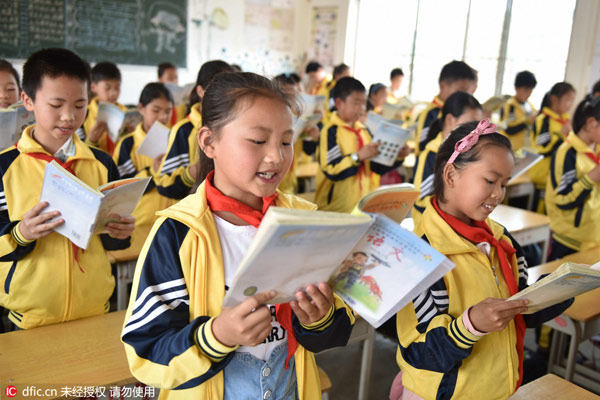Textbooks for Chinese language should put that first
Updated: 2016-05-28 09:12
By Zhang Zhouxiang(China Daily)
|
||||||||
 |
|
Pupils at Luocheng Mulao autonomous county in South China's Guangxi Zhuang autonomous region read on April 22, a day before the World Book Day. [Photo/IC] |
The Language & Culture Press, which is in charge of publishing the official Chinese language textbooks for middle and secondary schools nationwide, has recently aroused hot debate by announcing its plan to change 40 percent of the articles in the textbooks.
Among the changes, the most controversial is deleting an excerpt from a Chinese classic that describes a hero beating up a gang leader, and replacing it with one that describes how bandits stole an official's bribes. The Language & Culture Press explained the change by saying "violence is not in accordance with the values promoted in our society". To which the response has been: "So why do you promote robbery?"
Actually, this is not the first time Chinese language textbooks have aroused controversy. Since the late 2000s, every time the publisher has tried to change anything there has been a debate. When it tried to delete Lu Xun's articles about China in the 1920s, there was a public outcry that "they still apply today". The attempt to decrease the number of classics also met fierce opposition because "that's our cultural roots".
Among all domestic textbooks, changes to Chinese language textbooks get 99 percent of the public's attention. There has never been any widespread public discussion about changes to any other textbooks.
The reason for this is: People expect more of Chinese language textbooks. Some expect the books to promote traditional culture, some want them to enhance patriotism, while many officials hope they will inform children of the "glorious achievements of the State in the modern era".
Each of these requirements comes with public pressure and the publisher has no choice but to meet them. However, the textbooks that result are compromises, as they try in some way to please all the different demands. They consider the needs of all, except those of the users, the pupils.
- Tamper with history textbook
- Harry Potter makes appearance in Chinese textbook
- Correcting misconceptions about textbook publishing
- Chinese math textbook to be introduced into Britain
- New textbook to highlight traditional culture
- Textbook advocates Zhouzhuang culture
- Hypocrisy behind the recent 'racist textbook' controversy
- Few textbook answers from Nobel prize winner
- 2,000 refugees relocated on first day of major police operation
- No sign of EgyptAir plane technical problems before takeoff
- Chinese students at U. of Iowa accused of online cheating
- US Justice Dept. seeks death penalty for South Carolina shooter
- Global health entering new era: WHO chief
- Brazil's planning minister steps aside after recordings revelation

 Beijing style: People embrace the summer heat
Beijing style: People embrace the summer heat
 Ten photos from around China: May 21-27
Ten photos from around China: May 21-27
 VR, robots, mini drones: Highlights of big data expo in Guiyang
VR, robots, mini drones: Highlights of big data expo in Guiyang
 Fireworks light up Shanghai Disneyland
Fireworks light up Shanghai Disneyland
 Top 10 saving countries in the world
Top 10 saving countries in the world
 Men vs. Machine: different robots in daily life
Men vs. Machine: different robots in daily life
 Following Alibaba, its online merchants now eye listings
Following Alibaba, its online merchants now eye listings
 Traditional dresses for Yugur women in Northwest China
Traditional dresses for Yugur women in Northwest China
Most Viewed
Editor's Picks

|

|

|

|

|

|
Today's Top News
Liang avoids jail in shooting death
China's finance minister addresses ratings downgrade
Duke alumni visit Chinese Embassy
Marriott unlikely to top Anbang offer for Starwood: Observers
Chinese biopharma debuts on Nasdaq
What ends Jeb Bush's White House hopes
Investigation for Nicolas's campaign
Will US-ASEAN meeting be good for region?
US Weekly

|

|







